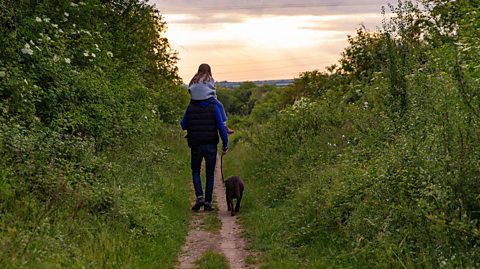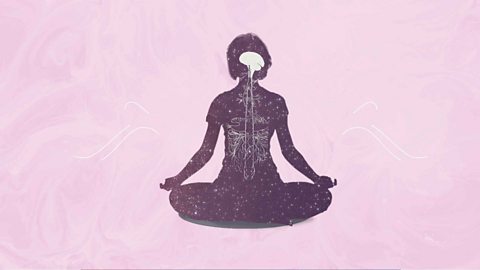All of us need ways of coping with the uncertainty of the pandemic. But if you find your 57th banana bread isn’t hitting the same spot as the first 20, it may be time to try a new stress-busting activity.
You might have already thought of going down a creative route by perhaps sketching or journaling, or trying new at-home workouts, but have you given any thought to what you’re listening to?
Nature sounds, ASMR and even white noise have all been touted as sleep aids over the past few years, with some also claiming that they help reduce anxiety.
And there are reasons for this in this, as professor of Acoustic Engineering at Salford Uni, Trever Cox, explains. Sounds do have the ability to calm us down, but which sounds are the most effective, and why?
The great outdoors
LISTEN: Some birdsong in the countryside
Walking is good for us for a number of reasons, especially now - the fresh air, exercise and change of scenery can all help lift our spirits. On top of that, the sounds we hear out and about in nature are proven to calm us down.
As for why, it depends on the sound. However Trevor says that a lot of the time it’s related to associations we’ve evolved to make. For example: “When [the birds] stop singing, you suddenly realise there might be something about which is a threat.”
Also, hearing lots of wildlife in prehistoric times would mean that the place was likely to have food, water, and other things necessary for life. Quiet, desolate places on the other hand signal to us that this place could be difficult to survive in.

The reaction we have to hearing sounds from places that are full of nature then, is that it calms us down - it makes us feel safe. And there’s been quite a few scientific studies that back this up. For example, a study conducted in 2017 at Brighton and Sussex Medical School measured the participants' reactions to both artificial sounds and sounds from nature. Those taking part in the study were also given an attention-based task to complete while listening.
They found that the subjects’ reaction times were much faster when listening to nature sounds. Not only that, but they also prompted a decrease in the body’s sympathetic response (which causes that 'fight-or-flight' response) and an increase in parasympathetic response, which is the one that helps the body relax and function in normal circumstances, and is sometimes referred to as the 'rest-digest' response.
Cities that never sleep could help us sleep
LISTEN: A bustling coffee shop
Associations entwined with certain sounds aren’t always remnants from our evolutionary pasts, however. As we move through life, we start to have experiences in certain settings, both positive and negative. A lot of our responses to sounds then, Trevor says, are to do with these learned associations.
He says sounds have the ability to “tell us where we are and set the scene”. When we like where that scene takes place, it’s likely the sounds will be calming to us. For example, if you like coffee, and you then hear the sound of a coffee machine in a café, you will anticipate the nice coffee that you’re about to have, and that will make you feel good.

Urban sounds have other associations that make them pleasant. So using the previous example of a bustling coffee shop, the sound of the other customers might have a positive impact on you: “It's a social space, and we're social animals.”
This could potentially be even more poignant now, when we can’t spend time around lots of people. As Trevor says, hearing these kinds of noises can help us feel like we’re less alone: “It kind of makes you feel connected to other people, even if you're not directly talking to them.”
But because this is based on experiences, it stands to reason that not everyone will have the same reaction to the same sounds. So, if you have some form of social anxiety, or you have any other reason for hating crowded places, the sound of the hubbub in a coffee shop might not make you feel calm at all.
Low and slow
Listen: Soothing spa music
It’s not just noises we find in our environment that people find relaxing - music can be specifically crafted to trigger similar responses. If someone asked you to think of relaxing music, there are certain characteristics that would spring to mind. The music you hear in a spa or massage clinic for example - it’s low, slow, and all in all quite soothing.
Crucially, this music is not invasive. You put it on in the background and you can almost, if not entirely, forget it’s there. Calming music tends not to be completely monotonous, but doesn’t do anything to startle you.
If you think about it, if you’re walking down the street and hear a loud crash, you’re likely going to jump out of your skin, or at least be a little bit confused. The same goes for music - loud crashing symbols, a sudden onset of trumpets or a fast and loud electric guitar solo can take you by surprise, and disturb your peace.
Trevor says this is very similar to our response to sounds in nature: “Leaves rustling in the trees… don't attract too much attention. They're in the background… and we find this calming because they're not taking a lot of mental effort to [listen to]. Whereas if you're trying to relax and someone's having a mobile phone conversation next to you, that's a very alerting sound full of information and we can't ignore it.”
So for this reason, he says calming songs tend to have a few similarities - they’re slower, less staccato (or jumpy with sharply played notes), and quieter.
I’m hearing static, it’s like an automatic
LISTEN: Television static
This line of thought goes some way to explain a few other weirder sleep and relaxation aids that you may have heard of. White noise is the term used to describe a sound that includes all audible frequencies, and can often sound like static. Playlists supposed to help you sleep will often have some white noise tracks in them, although Trevor says sleep experts don’t really recommend it anymore.
You may think this is entirely bizarre - what’s relaxing about a random buzzing noise?
“You use white noise to hide out other sounds,” Trevor explains.

“What you're trying to avoid with these calming sounds is actually tweaking danger signals in the brain. So, provided the sound is fairly quiet, and it's fairly constant, your brain kind of ignores it after a while.”
An example of this is your computer - you only notice it’s been making a noise all day when you finally turn it off and the fan stops whirring.
Loud invasive static noise would probably be very irritating, but at low levels it may serve to drown out sounds that might otherwise stop you from getting to sleep.
It’s also used as a design technique when planning urban areas - water fountains are often strategically places to minimise the disruption of noise from traffic, for example.
Dr Radha's three tips that can be carried out anywhere

Five potential health benefits of music
From weight loss to preventing snoring, music has a special way of keeping us healthy. Find out how here.

What would the world be like without forests?
Deforestation is happening all over the world, but what would happen if we ran out forest altogether?
